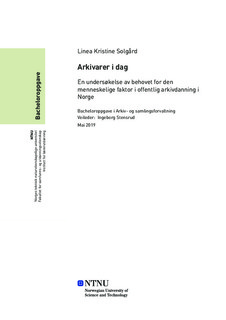Arkivarer i dag - En undersøkelse av behovet for den menneskelige faktor i offentlig arkivdanning i Norge
Bachelor thesis
Permanent lenke
http://hdl.handle.net/11250/2610378Utgivelsesdato
2019Metadata
Vis full innførselSamlinger
- Institutt for lærerutdanning [3692]
Sammendrag
Denne oppgaven tar for seg den menneskelige faktor innen arkivdanningen i Norge. Jegønsket å undersøke om det fremdeles er behov for arkivarer i dagens samfunn.For å finne ut av dette, kartla jeg hvilke arkivoppgaver som var mest fremtredende. Dettegjorde jeg ved å gjennomføre en nettbasert undersøkelse myntet på arkivarer i arbeid,undersøke jobbannonser med ordet ‘arkiv’ i seg, og gjennom en studie av akademisklitteratur.
Tre oppgaver skilte seg ut; brukerservice, kvalitetssikring og daglige arkivoppgaver (f.eks.postmottak og journalføring). Deretter har jeg gjennomgått disse oppgavene, og sett på styrkerog svakheter ved både teknologiske løsninger og menneskelig interaksjon i lys avarbeidsoppgavene.
Det jeg fant var at de tekniske løsningene hadde gode automatiseringsmuligheter, men varbegrenset til oppgaver uten skjønnsmessige vurderinger. Den menneskelige faktoren haddemulighet til å vurdere ut ifra skjønn, men hadde noen tydelige risikofaktorer dersom feil blegjort.
Jeg har vist at systemer gjør arkivoppgavene best, men konkluderer med at idealet er etsamspill mellom arkivarer og systemer. Den tradisjonelle arkivarrollen er i ferd med å bliutspilt, som baner vei for en moderne arkivarrolle. Slik kan samspillet fungere best muliggjennom en trygging av borgernes rettigheter. In this text I have focused on the human factor of the field of record keeping in Norway. Iwanted to explore the need for the role «record keeper» / «archivist» (terms like these doesn’treally translate, as there is a decisive distinction between the ones based in Norway, and theirEuropean counterparts.)
To that end, I have conducted some research about the most prominent tasks, takingadvantage of such tools as online surveys, dedicated towards working archivists, analysing 30job listings containing the word “arkiv”, while consulting the academic literature.
Three tasks quickly established themselves as the most prominent; user interaction, qualitycontrol and tasks commonly associated with the field, such as journaling and mail reception.Following this discovery, I reviewed the aforementioned tasks, looking at the strengths andweaknesses of both technological solutions and human interaction respectively.
This again led me to believe in the possibilities of the technological solutions currently inplace, but with the restriction of assignments that did not require any discretionaryassessments. The human factor, however, were able to make such assessments but with thedanger of committing errors.
In conclusion, the need for a record keeper/ archivist today is one of some discussion. Themore traditional role of an archivist is about to be made unnecessary, due to the technologicaladvancements in today’s society. This, however, does not mean the end of the role ofarchivists, only an evolution of what it means to be one. The role needs to evolve, andworking together with the technology, create a new form of archivists, which can provide thebest results for the citizens/users of the archives through the protection of their rights.
